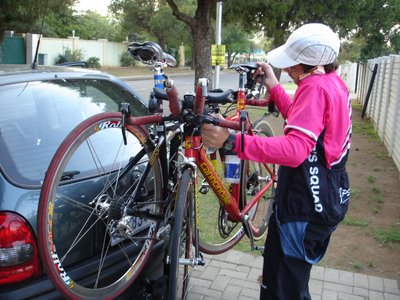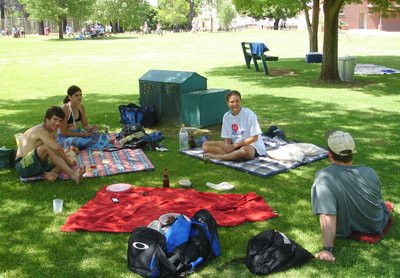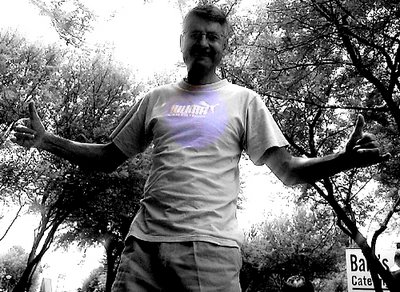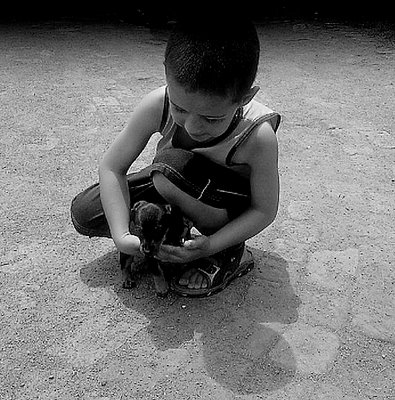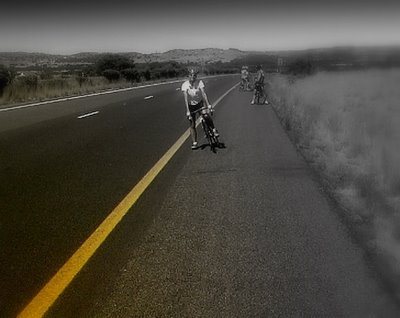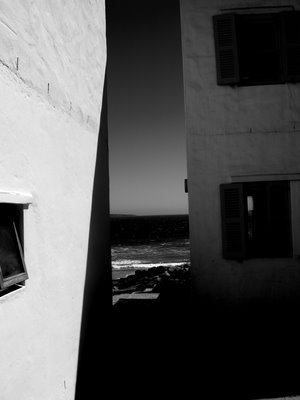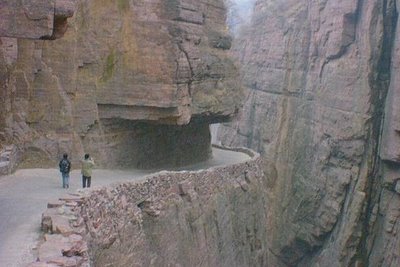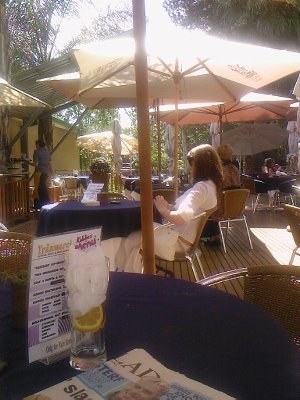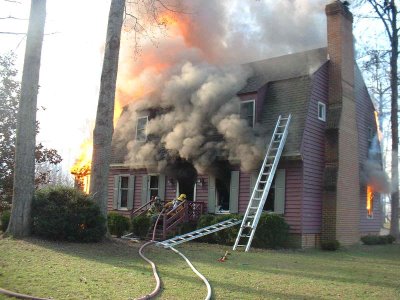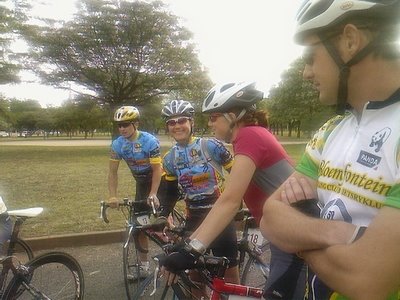
 Okay, I admit it. The world is running out of oil, but before it does...ssshhh...there is a car I would like to buy.I know that sounds like wanting to shoot a rhino before it becomes extinct, but while the party is still on, I would like my small crumb in the cake. My children will probably say, "Dad, what was a car?" Must I say something like: "Well, I stopped driving them because I knew we all would have to soon."Actually, you know, that sounds like something I might want to say in TheWorldAfterThis.Image below is of the Aygo (pronounced 'I go'), soon to be released in Europe, and then here.
Okay, I admit it. The world is running out of oil, but before it does...ssshhh...there is a car I would like to buy.I know that sounds like wanting to shoot a rhino before it becomes extinct, but while the party is still on, I would like my small crumb in the cake. My children will probably say, "Dad, what was a car?" Must I say something like: "Well, I stopped driving them because I knew we all would have to soon."Actually, you know, that sounds like something I might want to say in TheWorldAfterThis.Image below is of the Aygo (pronounced 'I go'), soon to be released in Europe, and then here. Kunstler's comments below...
Kunstler's comments below...October 9, 2006 Against the background of everything else happening in the financial markets is the apparent circumstance of peak oil. Even
The New York Times joined the chorus in a Sunday editorial, saying:
Our demand for petroleum products strains the limits of the global capacity to supply them. In past decades, if a pipeline broke in Nigeria, Saudi Arabia might compensate by setting workers to pumping more oil. Now, with little additional capacity, rising prices are necessary to balance out supply and demand.No more increasing capacity = peak oil. It's as simple as that. We now have nine and a half months of "rearview mirror" action to look back and see that world oil production has retreated from its all-time high of just over
85 million barrels a day (m/b/d) achieved in December 2005 (just as geologist Kenneth Deffeyes of Princeton had predicted). For 2006, production has remained in the
84 m/b/d range every month reported so far, while
demand has exceeded that.
Texas oil man Jeffrey Brown, a commentator at
TheOilDrum.com, the outstanding oil discussion group on the Internet, makes the point that Saudi Arabia is at the same point statistically (in terms of ultimate recoverable reserves) that Texas was at in 1972 when production there peaked.
The world's four greatest oil fields are in depletion (Burgan [Kuwait], Daqing [China], Cantarell [Mexico], and Ghawar [Saudi Arabia]) and these have accounted for
over 14 percent of the world's oil production. (Ghawar alone accounts for over
60 percent of Saudi Arabia's production.)
The North Sea has peaked and production there is
"crashing." Venezuela has peaked and its oil is shitty heavy crude. Indonesia (an OPEC member) has peaked and is now a net oil importer. Nigeria's political chaos is making production increasingly difficult-to-impossible. Production in the Canadian tar sands
is not making up for losses elsewhere. The US is down to about a four-year supply of conventional crude and condensates while we import 70 percent of the oil we consume. Discovery of new oil (including Chevron's largely hypothetical deepwater "Jack" finds) is barely covering a fraction of the world's consumption. So it goes....
Where finance is concerned, the basic implication of peak oil is pretty stark:
an end to industrial expansion (i.e. "growth"). All the alternatives to oil will not keep the industrial economies expanding -- they can only slow down a contraction, and only marginally so. The trouble with this picture is that finance is a system that uses paper markers to represent the hope and expectation for the expansion of wealth. These markers are currencies, stocks, bonds, option contracts, derivatives plays, and other certificates that are traded in open markets. If there is no longer any hope of increased wealth in the world, then all those tradable paper markers become losers.
Their value unwinds and imagined piles of wealth evaporate into thin air. The unwinding process
depends on the psychology of the people who own these certificates. If they do not understand the global oil situation and its implications, then they will continue to hope for and expect expanded wealth, and thus continue to regard their paper certificates as credible markers of value. And that is largely the case at the moment, since most of the playas in the financial markets
are not paying attention to the peak oil story, or don't believe it is for real.
Two special and transient circumstances are now propping up the financial markets. One is that for practical purposes the world is virtually at peak, meaning this is an
extra-special time of strange behavior (like the point in the apogee of a steep sub orbital flight in which passengers become momentarily weightless). Supply and demand for oil are only beginning to go out of whack (that is,
demand just barely exceeding supply). Even at this early stage, the oil markets themselves are showing stress, as hoarding behavior sets in and induces wider swings of price volatility. But these swings in oil prices -- such as the one we're in right now, where prices have crashed 20 percent since the panic buying (hoarding) of June and July --
send false signals to the financial playas. The main false signal is that
all is well on the global oil scene...there's no real supply problem...and hence no threat to the continuing expansion of industrial production and its associated wealth-generating activities. This signal just tells the playas to buy more paper markers.
Thus, the stock market goes up.
The way to peak is that financial markets take on a life of their own -- as existing wealth "invests" itself in more paper markers hoping and expecting to "grow" into even more wealth. The problem here is that
existing wealth is actually being squandered, since the paper markers will only lose value as the hopes and expectations vested in them dissolve in disappointment. But we haven't quite reached that point yet.
In simply bidding the markets up, the system has spun off even more gobs of presumed wealth. Some of this "liquidity" -- say, in the checking accounts of people who work for Goldman Sachs -- has found its way into Manhattan condominiums, or Aspen McMansions, and filtered through the system to everyone from the lawyers who write up the pre-nuptial agreements to the guys who sell the furniture to the people who drive the delivery trucks that bring it to the door, to the men laying tiles in the new bathrooms.
The basic insanity of a system that
presumes vastly increased wealth where none will occur, has led to further distortions in finance. The most obvious one is the so-called housing bubble. The misplaced extreme expectation in the ever-increasing value of paper wealth, led to the hijacking of mortgages by financial playas who bundled them into odd lots of tradable debt (promises to pay) and used them to leverage abstruse bets (hedges) on the behavior of other kinds of paper markers (currencies, interest rate differentials, commodity prices) -- very profitably as long as all playas believed that industrial societies that run all oil would continue to grow, to produce more wealth.
The level of abstraction in these rackets -- their distance from the reality of productive activity --is self-evident.
But they were so successful that the profligate creation of ever more mortgages became an increasingly reckless and irresponsible enterprise. Contracts were made with house-buyers who had no record of credit worthiness and often no real proof of income. Contracts were made on terms (interest payments) that were deceptive, even ruinously false, for the house-buyers. The
reckless reassignment of lending risk into ever more abstract layers of deferred obligation, and the ease of credit that ensued, allowed millions of ordinary people to acquire real property on unrealistic terms, which had the affect of bidding up the price of houses that these owners will eventually have to surrender for nonpayment.
That process is now underway. The reckless creation of mortgages had the further effect of stealing demand for house-building from the future. So many new houses were built and then sold to people who will probably have to surrender them, and then so many more beyond that were built in the expectation and hope that reckless mortgage creation would continue forever, that there is now a massive over-supply of total existing houses while the pool of suckers for new ruinous mortgages has shrunk to zero.
Similar excesses in all the other lending and debt sectors, including "non-performing" credit card obligations and government deficits, will also unwind and thunder through the system.
Meanwhile, the false signal from the oil markets that has been broadcasting for eight weeks will come offline and a new signal will come on as prices go back up. The pause in bidding for future oil induced by the panic over-buying of the summer will end.
The heating season is here. It's 40 degrees out in upstate New York this morning and the furnace is cranking. The Chinese and the Indians and even the people in France have not stopped using oil, even if Americans have put their Winnebagos up on blocks for the season.
As the price of oil goes back up, the financial markets will get a new signal that running industrial societies has just gotten more expensive again. That will dampen hopes and expectations for increased wealth from these societies. Meanwhile, the air will be coming out of millions of mortgages, and the loss of value will spread among playas holding these bundles of mortgage debt (i.e. promises that money spent on houses is being paid back, which it won't be). At the same time the houses themselves will lose value as the pool of potential buyers shrinks to nothing. That is, the inflated value (high price) of these assets will deflate.
As this occurs, there will be far fewer wage-earners putting up additional houses, fewer furniture sales, fewer trips by delivery truck drivers and fewer tile-jobs in the McBathrooms.
This is why I view the
fall melt-up of the stock markets as a swan dive. We're at the apogee now, just as
the world is at the apogee of its oil production. I confess, I thought the reality of our economic predicament would be recognized by the playas and their markets sooner than it has. It turns out the chief luxury of the final cheap oil blowout has been the
artificial support of unrealistic hopes and expectations.
from www.kunstler.com
